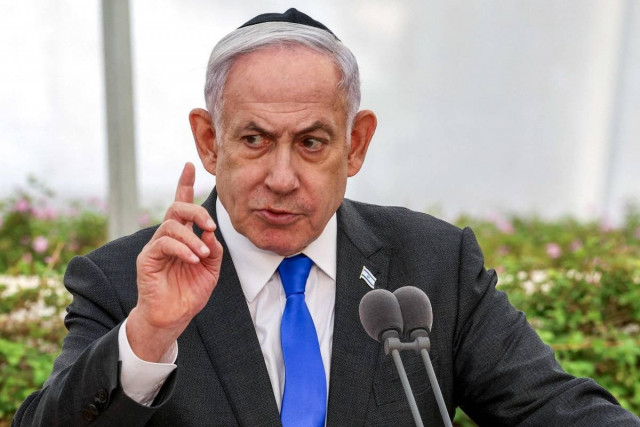Netanyahu signals end to intense Gaza war phase amid renewed bombings
Israeli PM clarifies war is not about to end, but intense phase is about to end in Rafah

A day after Israel’s Prime Minister Benjamin Netanyahu said the “intense phase” of the Gaza war was winding down, the army bombed targets in the Palestinian territory on Monday, and Hamas again demanded a permanent end to the fighting.
The premier spoke in a TV interview on Sunday as Defence Minister Yoav Gallant travelled to Washington for what he called “critical” talks with Israel’s top ally and arms supplier.
Netanyahu, in his first Israeli media interview, since the October 7 attack by Hamas militants started the bloodiest ever Gaza war, told Channel 14 that “the intense phase of the fighting against Hamas is about to end”.
He stressed this “doesn’t mean that the war is about to end, but the war in its intense phase is about to end in Rafah,” the far-southern city near Egypt that is the last part of Gaza to face a full ground invasion.
“The goal is to return the kidnapped and uproot the Hamas regime in Gaza,” the premier said, again rejecting the permanent ceasefire demanded by Hamas during on-and-off talks involving the United States and other mediators.
Netanyahu said Israel would then be able to “redeploy some forces to the north” on the border with Lebanon, where exchanges of fire with the Hezbollah movement have escalated, but said this would be “primarily for defensive purposes”.
Read: As tanks push further into Rafah, Israeli forces kill senior Gaza health official
Hamas’s October attack on southern Israel resulted in the deaths of 1,194 people, mostly civilians, according to an AFP tally based on Israeli official figures.
The militants also seized hostages, 116 of whom remain in Gaza although the army says 41 are dead.
Israel’s retaliatory offensive has killed at least 37,626 people, also mostly civilians, the health ministry in Hamas-ruled Gaza said.
‘We are all dead’ With fears growing of full-scale war in Lebanon, Netanyahu said Israel would return its displaced citizens to their evacuated northern border communities, through diplomacy or by “another way”.
When asked about Gaza's post-war scenarios, he said Israel would maintain “military control in the foreseeable future” but also wants to create “a civilian administration, if possible with local Palestinians” and regional backing.
Hamas called Netanyahu’s comments “clear confirmation of his rejection of the recent (UN) Security Council resolution and the proposal of US President Joe Biden” for a hostage release and truce agreement.
The Security Council on 10 June adopted a US-drafted resolution supporting a Gaza ceasefire plan.
Biden had billed the plan as an Israeli offer, although some right-wing Israeli politicians critical to Netanyahu’s coalition government opposed it.
Also read: Tokyo event recreates Gaza carnage to highlight Palestinians' plight
On Monday, though, Netanyahu told Parliament: “We are committed to the Israeli proposal that President Biden endorsed.”
Netanyahu is also pressured by protesters who regularly take to the streets – by the tens of thousands on Saturday – demanding new elections and a deal to free the hostages.
The Hostages and Missing Families Forum campaign group said ending the war without bringing all the captives home would be a “national failure”.
Along with its insistence on a permanent ceasefire, Hamas says any deal must include a full Israeli withdrawal to stop “Netanyahu’s attempts to evade, deceive and perpetuate the aggression.”
Israeli forces kept up their bombing of targets in central Gaza and Rafah, witnesses said, while gun battles were reported in the Gaza City area.
“We are clearly approaching the point where we can say we have dismantled the Rafah Brigade (of Hamas),” Israel’s army chief Lieutenant General Herzi Halevi told troops in the southern city.
The conduct of the war has led to growing tensions between Biden and Netanyahu, who vowed in his interview: “We will win.”
Read more: Hostage crisis tops agenda as Israeli defense Minister meets US officials
United States officials have raised doubts over Israel’s goal of completely destroying Hamas. On Wednesday Israel’s top army spokesman, Rear Admiral Daniel Hagari, said Hamas is an ideology and “we cannot eliminate an ideology”.
Gallant was expected to hold talks on Monday with Defence Secretary Lloyd Austin and Secretary of State Antony Blinken, after declaring on his departure that “our ties with the United States are more important than ever”.
Netanyahu has accused Washington of slowing or freezing some arms and ammunition deliveries in recent months – a claim which US officials have strongly rejected.
Washington said only one shipment of 2,000-pound bombs is under review because of concerns about their use in densely populated areas of Gaza.
A new damage assessment by the United Nations Satellite Centre found that about 65 per cent of Gaza’s total road network has been damaged or destroyed.
Philippe Lazzarini, chief of the United Nations agency for Palestinian refugees, UNRWA, said “the breakdown of civil order” in Gaza has led to “rampant looting and smuggling” that impede aid deliveries to a territory confronted with “catastrophic levels of hunger.”



















COMMENTS
Comments are moderated and generally will be posted if they are on-topic and not abusive.
For more information, please see our Comments FAQ